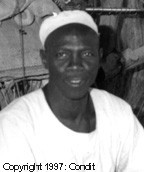Warji, Warjawa in Nigeria

Photo Source:
Bethany World Prayer Center
|
Send Joshua Project a map of this people group.
|
| People Name: | Warji, Warjawa |
| Country: | Nigeria |
| 10/40 Window: | Yes |
| Population: | 155,000 |
| World Population: | 155,000 |
| Primary Language: | Warji |
| Primary Religion: | Islam |
| Christian Adherents: | 20.00 % |
| Evangelicals: | 10.00 % |
| Scripture: | Portions |
| Ministry Resources: | Yes |
| Jesus Film: | Yes |
| Audio Recordings: | Yes |
| People Cluster: | Chadic |
| Affinity Bloc: | Sub-Saharan Peoples |
| Progress Level: |
|
Introduction / History
Most Warji (also called Warjawa) live in the Warji and Ganjuwa districts in Bauchi Province of Nigeria, where they have remained for many generations. Much of this area is known as Ningi, and is quite fertile, being well-watered by the Delimi and Bunga Rivers. It is a plateau region with thick tree growth, many streams and a variety of animals. The Warji are closely related to their neighbors the Afawa, with whom they share similarities in language and culture. Warji are also geographically and politically related to the Butawa. Besides their own Chadic language, the Warji speak the Hausa language of their more powerful neighbors as a secondary language. Those Warji who have settled in Kano state, across the boundary of Bauchi, have adopted the Hausa religion, language and style of dress. These people are Muslim, but there are gospel inroads among the Warji in other places.
What Are Their Lives Like?
Farming is the basis of Warji livelihood. Farmers grow guinea corn, rice, millet, sweet potatoes, okra, and peppers. Most families keep sheep, goats, horses, and some cattle, which are often tended by Fulani nomads. Other occupations include hunting, fishing, making palm-leaf mats, dyeing, and trading. Warji villages are separated into wards which include the extended families, each ward having as its leader the eldest male of the family. For the elders, each ward has a clubhouse, essentially a round shelter supported by strong branches with stone slabs for seats. Warji youths also have clubhouses built around tall poles and painted with red, white and black bands. Because the Warji are surrounded by mountains and because motor roads in the area are poor, it is difficult to travel in or out of the region. Those living in rural areas show little signs of modernization, and most children do not attend school. Young men may choose wives subject to the approval of their parents. Until he marries, the suitor must perform manual work, usually on the farm of the girl's family. Polygamy is a common practice, and women often leave their husbands. Every four years, boys from ages seven to nine are taken outside the village to the sacred grove of the forest to be circumcised. After two months of healing and rigorous training, they are brought back, and they celebrate with a festival. At the age of fifteen, the priest-chief takes the boys to the shrine of the dodo (a masquerade cult of the ancestors) to undergo training and discipleship and to learn their traditional mysteries. Other important ceremonies include the planting and harvesting festivals and the rain cult. These rites and festivals are accompanied by much feasting, drinking, dancing, and wrestling contests. The priest makes offerings and sacrifices to ensure plenteous crops and rains. The Yinna festival gives a chance for the youth to show their strength and bravery. After much food and drink, the youth visit and dance in the homes of others their age.
What Are Their Beliefs?
The Warji people of Nigeria live in fear of their dead ancestors and the gods of nature. They practice sorcery and exorcism, and when serious sickness or tragedy arises, they resort to blood sacrifice. Officially they are Muslim, but a high enough percentage are Christian believers that they are not considered an unreached people group. In the future, they will probably become either more Islamized or more Christianized. This is why it's so important to pray for them at this time.
What Are Their Needs?
More than improved roads or continuing education, the Warji need Jesus in their lives. There is a need for more prayer and mission work to help them look to Jesus Christ and him crucified rather than the Islamic religious system or their ancestral spirits for their needs. Warji believers need to be discipled so they can understand the reason for their faith and grow closer to the Risen Christ.
Prayer Points
Pray for the Lord to show himself powerful to the Warji people by giving them an abundant harvest so they will put their complete faith in him rather than any other. Pray that hundreds of Warji people who identify as Muslims will understand that they need the saving power of Jesus Christ. Pray for a spiritual hunger among the Warji people that will draw them to the only Savior. Ask the Lord to save key leaders among the Warji who will boldly declare the gospel. Ask the Lord to bring forth a strong and growing Warji church that will become a church planting movement; churches that plant several other churches, that plant several others.